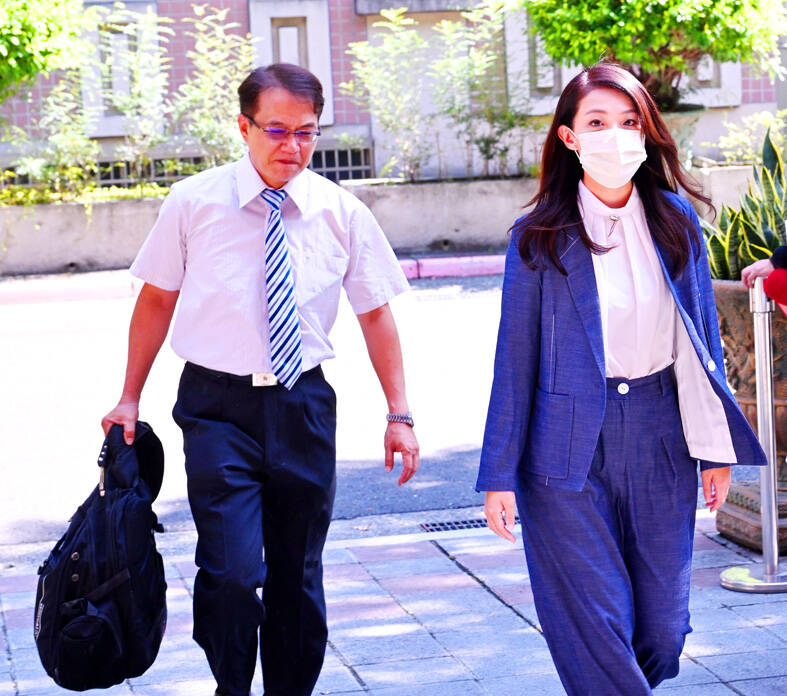Suspended Hsinchu mayor Ann Kao (高虹安) was yesterday sentenced to 10 months in prison for falsely accusing a US academic of defamation.
The Taipei District Court handed down the ruling yesterday morning. It can be appealed.
The accusation stems from Facebook posts made by in 2021 and 2022 by Chen Shih-fen (陳時奮), a political pundit and director of Western Washington University’s Center for International Business, who was writing under the pseudonym Tario Ong (翁達瑞).

Photo: Liu Hsin-de, Taipei Times
Chen said that Kao, in her doctoral thesis for the University of Cincinnati, used significant amounts of uncited content from two Institute for Information Industry studies that she had coauthored.
He also said that her academic adviser had removed her name from the roll and the university had removed her thesis from its database.
Saying the accusations were untrue, Kao sued Chen for aggravated defamation.
The Taipei District Prosecutors’ Office did not pursue litigation, saying that Chen had correctly identified 18 areas in which Kao’s thesis closely resembled the two institute studies.
Chen later filed a countersuit accusing Kao of making false accusations against him.
He said that Kao returned to the university twice in August 2022 to revise her thesis and add the missing citations, then sued him for defamation the following month without informing the prosecutor of the changes.
Her actions showed she knew his accusations were true, but she still accused him of defamation, Chen said.
Kao’s lawyer said that before they filed the lawsuit, the university and institute said there was no issue with her thesis.
The institute later changed its mind, but it had nothing to do with the lawsuit and Kao did not intend to make a false accusation, the lawyer said.
Additional reporting by CNA

CHAOS: Iranians took to the streets playing celebratory music after reports of Khamenei’s death on Saturday, while mourners also gathered in Tehran yesterday Iranian Supreme Leader Ayatollah Ali Khamenei was killed in a major attack on Iran launched by Israel and the US, throwing the future of the Islamic republic into doubt and raising the risk of regional instability. Iranian state television and the state-run IRNA news agency announced the 86-year-old’s death early yesterday. US President Donald Trump said it gave Iranians their “greatest chance” to “take back” their country. The announcements came after a joint US and Israeli aerial bombardment that targeted Iranian military and governmental sites. Trump said the “heavy and pinpoint bombing” would continue through the week or as long

TRUST: The KMT said it respected the US’ timing and considerations, and hoped it would continue to honor its commitments to helping Taiwan bolster its defenses and deterrence US President Donald Trump is delaying a multibillion-dollar arms sale to Taiwan to ensure his visit to Beijing is successful, a New York Times report said. The weapons sales package has stalled in the US Department of State, the report said, citing US officials it did not identify. The White House has told agencies not to push forward ahead of Trump’s meeting with Chinese President Xi Jinping (習近平), it said. The two last month held a phone call to discuss trade and geopolitical flashpoints ahead of the summit. Xi raised the Taiwan issue and urged the US to handle arms sales to

A magnitude 5.6 earthquake struck off the coast of Yilan County at 12:37pm today, with clear shaking felt across much of northern Taiwan. There were no immediate reports of damage. The epicenter of the quake was 16.9km east-southeast of Yilan County Hall offshore at a depth of 66.8km, Central Weather Administration (CWA) data showed. The maximum intensity registered at a 4 in Yilan County’s Nanao Township (南澳) on Taiwan’s seven-tier scale. Other parts of Yilan, as well as certain areas of Hualien County, Taipei, New Taipei City, Taoyuan, Hsinchu County, Taichung and Miaoli County, recorded intensities of 3. Residents of Yilan County and Taipei received

Taiwan has secured another breakthrough in fruit exports, with jujubes, dragon fruit and lychees approved for shipment to the EU, the Ministry of Agriculture said yesterday. The Animal and Plant Health Inspection Agency on Thursday received formal notification of the approval from the EU, the ministry said, adding that the decision was expected to expand Taiwanese fruit producers’ access to high-end European markets. Taiwan exported 126 tonnes of lychees last year, valued at US$1.48 million, with Japan accounting for 102 tonnes. Other export destinations included New Zealand, Hong Kong, the US and Australia, ministry data showed. Jujube exports totaled 103 tonnes, valued at